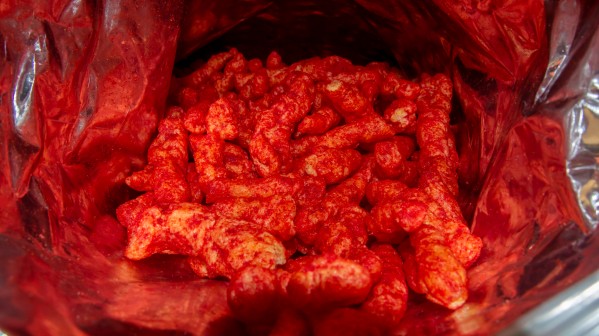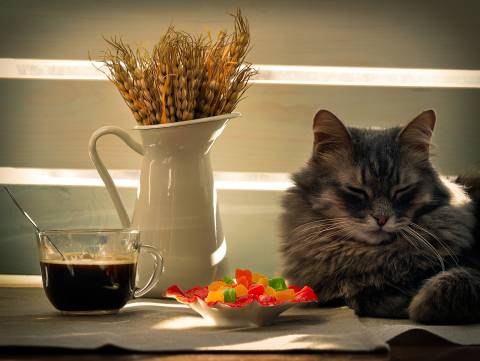
Connect with a verified veterinarian in minutes. Licensed vets are available 24/7 to answer your questions. No need to worry about your furry family member.
Hot Cheetos are a very popular snack food! Many people love eating these very spicy Cheetos. But what happens if your cat eats hot Cheetos?
Has your cat eaten hot Cheetos? Are you worried the hot Cheetos will make your cat sick? If so, then you’ve come to the right place. We understand it’s scary when your cat eats something she shouldn’t.
In this article, we’ll take a look at hot Cheetos and whether or not they can make your cat sick. Let’s get started!
What are Hot Cheetos?
The real name of hot Cheetos is “Flaming” hot Cheetos. This extremely popular snack is made from a blend of cornmeal and water. This is then heated under pressure, with hot air causing steam in the mixture to expand giving them their unique texture. After the Cheetos have been fried or baked, they are then tumbled with a flavoring.
Hot Cheetos are tumbled with a very hot, spicy flavoring. They include the following ingredients:
- Cornmeal
- Vegetable oil
- Cheddar cheese
- Onion powder
- Whey
- Salt
- Garlic
While hot Cheetos are safe for humans, what about cats? Is it OK for cats to eat hot Cheetos?
Hot Cheetos & Cats
The answer is that cats should not eat hot Cheetos. There are several reasons for this. For one thing, the Cheetos are too spicy for cats and can cause tummy upset and extreme irritation in the cat’s digestive tract. What’s more, the snack contains garlic and onion, both of which are toxic to cats. Finally, Cheetos contain high amounts of salt and fats, which are also bad for cats.
If your cat has licked a hot Cheeto or eaten one or two hot Cheetos, then the chances are that she will be just fine. However, if she ate multiple hot Cheetos, then she could become sick.

Review symptoms, medications & behavior to keep your pets healthy with a Vet Online in just minutes.
Ask a Vet Live NowSymptoms of Hot Cheeto Ingestion in Cats
You may notice these symptoms if your cat has eaten hot Cheetos:
- Vomiting
- Diarrhea
- Stomach pain
- Lack of appetite
- Lethargy
If your cat is showing any of these symptoms, then it’s best to call the vet. They will be able to provide you with the best information on what you need to do to help your cat.
Treatment for Cats that Have Eaten Hot Cheetos
If your cat develops continuous diarrhea and vomiting, then she will need to see the vet. This is because ongoing tummy troubles can lead to dehydration, which can be dangerous for your cat. The vet has medications that can be given to help your cat’s symptoms, ending the vomiting and diarrhea.
If your fur baby is very unwell then she may require an IV for fluids and to give her medications through.
So, if your cat has eaten one or two hot Cheetos or just licked a Cheeto, then she will probably be OK. However, if she has eaten lots of hot Cheetos and develops symptoms of digestive tract issues, then it’s time to call the vet.
Although it is worrying if your cat needs to see the vet, the prognosis is usually excellent. She will be OK with prompt treatment and will probably avoid hot Cheetos in the future!
Connect with a verified veterinarian in minutes. Licensed vets are available 24/7 to answer your questions. No need to worry about your furry family member.

Rebecca MacMillan, BVetMed BSAVA PGCertSAM MRCVS
This article has been reviewed and approved by an independent Veterinarian: Rebecca is a companion animal vet who has always had a passion for writing and client communication. Since her graduation from the Royal Veterinary college in 2009 she has gained a wealth of experience in first opinion small animal practice, in both clinical and managerial roles. She currently works in the South West and deals with a variety of routine and emergency appointments, but particularly enjoys medicine cases. Outside of work and writing, she enjoys spending time with her family, including her bouncy flat coated retriever George!
Review symptoms, medications & behavior to keep your pets healthy with a Vet Online in just minutes.
Ask a Vet Live Now




